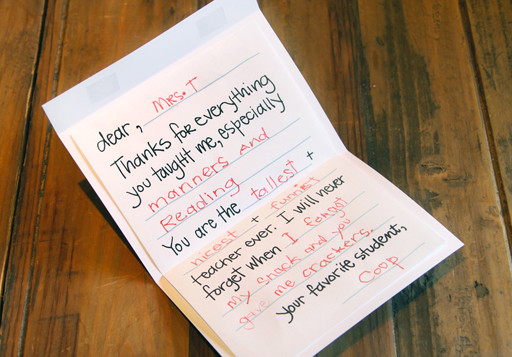In January 2018, I was commuting from Brooklyn to New Jersey.
2018年1月,我從布魯克林到新澤西上班。
I have two little kids and a busy consulting business, so a quiet train ride felt like a mini vacation.
我有兩個小孩和一個業(yè)務(wù)繁忙的咨詢公司,所以安靜的坐火車就像一個小假期。
Yet I found myself spending that precious time slack-jawed, scrolling through my social media feeds.
然而,我發(fā)現(xiàn)自己把那段寶貴的時間用于發(fā)呆,瀏覽我的社交媒體。
One day, I put down my phone and started writing thank-you notes to people who had contributed to a fundraiser I had organized.
一天,我放下手機,開始給那些為我組織的募捐活動捐款的人寫感謝信。
When I got off the train that day, I was in a noticeably better mood.
那天我下火車時,心情明顯好了許多。
The next day, I wrote more thank-yous — and felt the same afterglow.
第二天,我又寫了更多的感謝信——也體會到同樣的美好感受。
When I finished writing the notes, I counted them up.
當(dāng)我寫完感謝信后,我數(shù)了一下。
There were 31—one for every day of the year so far.
有31封,到目前為止,一月份每天一封。
Something clicked. What if I kept it up?
我突然想到,如果我堅持寫下去會怎么樣呢?
I decided to write one thank-you note for every day of that year.
我決定為那一年的每一天寫一封感謝信。
I had no shortage of people I was grateful for.
我不缺少要去感激的人。
So I picked out a different theme for each month to keep on task.
所以,我為每個月挑選了一個不同的主題來繼續(xù)這個任務(wù)。

January was charity—and, thankfully, I had already completed that goal.
一月份是慈善活動,謝天謝地,我已經(jīng)完成了這個目標(biāo)。
February would be dedicated to neighbors, I decided, and I thought of a dozen names right away.
我決定把二月份獻給鄰居,我馬上想到了很多名字。
I remembered when the owners of our local bookstore let me and my five year-old son, Henry, in before the store opened
我記得當(dāng)?shù)貢甑睦习逶诘赇仩I業(yè)前讓我和五歲的兒子亨利進去,
and offered to play his favorite soundtrack (Mary Poppins).
還播放了他最喜歡的音樂(《歡樂滿人間》)。
I recalled when our 14-year old babysitter dropped off a bag of old board games for our kids to play.
我記得我們14歲的保姆送了一袋舊棋盤游戲給孩子們玩。
Writing the notes wasn't all that time-consuming: Each was two or three sentences long, taking just a few minutes to compose.
寫感謝信并不那么費時:每封感謝信有兩三句話長,只需要幾分鐘就能寫完。
I focused on the person I was writing to and what I wanted to say, and the words came fairly easily.
我把注意力集中在我要感謝的人和我想說的話上,這些話很容易就能說出來了。
I quickly learned I couldn't do it while listening to a podcast or toggling between articles.
我很快意識到,我不能一邊聽播客,或看文章時寫感謝信。
That focus felt refreshing.
那種專注讓人覺得耳目一新。
It was good for my brain, which had been trained to wander, alighting on this feed or that e-mail, darting from app to app.
這對我的大腦很有好處,因為我的大腦已經(jīng)變得總走神,關(guān)注這條消息或那封電子郵件,從一個應(yīng)用跳到另一個。
It felt meditative to look at a blank white space with a pen in my hand, thinking about a person and the way he or she had helped me.
我手里拿著一支筆,看著空白的紙張,想著一個人,以及他/她幫助我的方式,這讓我感到自己在沉思。











